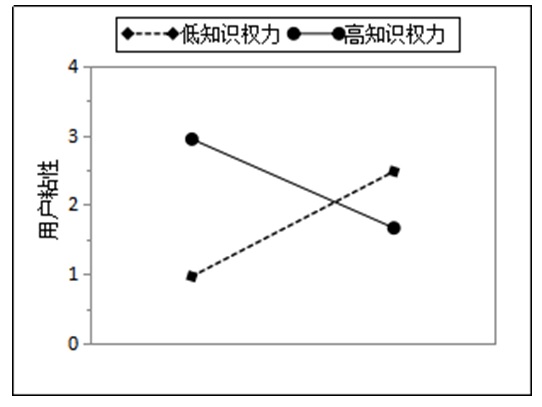 PDF(1283 KB)
PDF(1283 KB)


 PDF(1283 KB)
PDF(1283 KB)
 PDF(1283 KB)
PDF(1283 KB)
知识交流效率视角下虚拟学术社区社会资本对用户粘性的影响——基于知识权力的调节作用
The Influence of Social Capital on User Stickiness in Virtual Academic Communities from the Perspective of Knowledge Exchange Efficiency: Moderated by Knowledge Power
 ,
,
 ,
,

[目的/意义]探讨社会资本对虚拟学术社区用户粘性的影响机理,对于虚拟学术社区在业内竞争中稳定用户群体且实现可持续发展具有重要的理论和实践意义。[方法/过程]从虚拟学术社区的用户个人感知视角,深度解析其社会资本的构成维度,以此为切入点,探究社会资本、知识交流效率、用户粘性的理论结构模型,分析虚拟学术社区中衍生出的社区成员个体知识权力的调节作用,并基于从典型虚拟学术社区平台获取的270份样本数据结果的相关回归分析,验证社会资本、用户粘性、知识交流效率以及知识权力之间的相互作用关系。[结果/结论] 研究表明:社会资本有助于增强虚拟学术社区用户粘性;知识交流效率完全中介社会互动关系、社会信任对用户粘性的影响,部分中介共同愿景对用户粘性的影响;知识交流效率对用户粘性的影响受到知识权力负向调节作用,即知识权力程度越高,知识交流效率将会对用户粘性产生负向影响。
[Purpose/significance] It is of great theoretical and practical significance to explore the influence mechanism of social capital on the user stickiness of virtual academic communities, which is to stabilize the user group of this community in the industry competition. [Method/process] From the perspectives of the users' personal perception of virtual academic communities, this paper made a deep exploration on its dimensions of social capital, as a breakthrough point to explore the theoretical structure model on social capital, knowledge exchanges efficiency, user stickiness, and analyzed the adjustment role of the individual knowledge power derived from the virtual academic communities. The relationship between these variables was verified by the regression analysis of 270 samples data from the typical virtual community platforms. [Result/conclusion] The research shows that social capital contributes to the user stickiness of virtual academic communities. The knowledge exchange efficiency plays a complete mediation role between social interaction, social trust and user stickiness, and plays a partial mediation role between common vision and user stickiness. The influence of knowledge exchange efficiency on user stickiness is negatively regulated by knowledge power, that is, the higher the degree of knowledge power, the higher the efficiency of knowledge exchange will have a negative impact on user stickiness

虚拟学术社区 / 社会资本 / 用户粘性 / 知识交流效率 / 知识权力
virtual academic communities / social capital / user stickiness / knowledge exchange efficiency / knowledge power
| [1] |
周军杰. 社会化商务背景下的用户粘性: 用户互动的间接影响及调节作用[J]. 管理评论, 2015, 27(7): 127-136.
|
| [2] |
POLITES G L, WILLIAMS C K, KARAHANNA E, et al. A theoretical framework for consumer e-satisfaction and site stickiness: an evaluation in the context of online hotel reservations[J]. Journal of organizational computing and electronic commerce, 2012, 22(1): 1-37.
|
| [3] |
NAHAPIET J, GHOSHAL S. Social capital, intellectual capital, and the organizational advantage[J]. Academy of management review, 1998, 23(2): 242-266.
|
| [4] |
王馥芳. 警惕技术权力这把“双刃剑”[J]. 党政视野, 2016(6): 68.
|
| [5] |
王忠义, 张鹤铭, 黄京, 等. 基于社会网络分析的网络问答社区知识传播研究[J]. 数据分析与知识发现, 2018, 2(11): 80-94.
|
| [6] |
潘伟, 张庆普. 感知的知识所有权对知识隐藏的影响机理研究——基于知识权力视角的分析[J]. 研究与发展管理, 2016, 28(03): 25-35,46.
|
| [7] |
芮正云, 罗瑾琏. 新创企业联盟能力、网络位置跃迁对其知识权力的影响——基于知识网络嵌入视角[J]. 管理评论, 2017, 29(8): 187-197.
|
| [8] |
王爱华. 基于互联网平台的公益跨界合作: 过程、机制与风险——以腾讯“99公益日”为例[J]. 公共管理与政策评论, 2019, 8(1): 70-79.
|
| [9] |
程志超, 吴印博. 社会资本视角下虚拟社区知识分享对用户粘性的影响机制研究[J]. 情报科学, 2017, 35(12): 18-23.
|
| [10] |
CHOW W S, CHAN L S. Social network, social trust and shared goals in organizational knowledge sharing[J]. Information & management, 2008, 45(7): 458-465.
|
| [11] |
程志超, 郭天超. 基于成员自我展示的虚拟社区自运行机制——自我展示的效用及其对社会认同的影响[J]. 系统工程, 2016, 34(2): 144-152.
|
| [12] |
TSENG F C, KUO F Y. A study of social participation and knowledge sharing in the teachers online professional community of practice[J]. Computers & education, 2014, 72(1): 37-47.
|
| [13] |
张敏, 郑伟伟, 石光莲. 虚拟学术社区知识共享主体博弈分析——基于信任的视角[J]. 情报科学, 2016, 34(2): 55-58.
|
| [14] |
TSAI W, GHOSHAL S. Social capital and value creation: the role of intrafirm networks[J]. The academy of management journal, 1998, 41(4): 464-476.
|
| [15] |
王美月, 王萍, 贾琼,等. 基于动态用户画像的学术虚拟社区粘性驱动机制研究[J]. 现代情报, 2019, 39(7): 9-17.
|
| [16] |
吴瑶, 肖静华, 谢康, 等. 从价值提供到价值共创的营销转型——企业与消费者协同演化视角的双案例研究[J]. 管理世界, 2017 (4): 138-157.
|
| [17] |
张敏, 唐国庆, 张艳. 基于S-O-R范式的虚拟社区用户知识共享行为影响因素分析[J]. 情报科学, 2017, 35(11): 149-155.
|
| [18] |
周涛, 陈可鑫, 邓胜利. 社群学习用户持续参与行为机理研究[J]. 现代情报, 2019, 39(1): 43-50.
|
| [19] |
张垒. 期刊知识交流效率及影响因素分析——基于DEA_Tobit两阶段法[J]. 科学学研究, 2015, 33(4): 516-521,615.
|
| [20] |
BARWICK M A, BOYDELL K M, STASIULIS E, et al. Knowledge transfer and implementation of evidence-based practices in children’s mental health[R]. Toronto: Chirdren’s mental health Ontario, 2005: 24-26.
|
| [21] |
康淑娟, 安立仁. 知识距离视角下全球价值链网络嵌入与创新能力的关系研究[J]. 财经理论与实践, 2019, 40(4): 107-115.
|
| [22] |
赵杨, 袁析妮, 李露琪, 等. 基于社会资本理论的问答平台用户知识付费行为影响因素研究[J]. 图书情报知识, 2018 (4): 15-23.
|
| [23] |
王晨燕. 社区网络媒体中意见领袖的识别、特征和作用[J]. 山东社会科学, 2015 (3): 132-136.
|
| [24] |
GUPTA A K, GOVINDARAJAN V. Knowledge management's social dimension: lessons from Nucor Steel[J]. MIT Sloan management review, 2006, 42(1): 71-80.
|
| [25] |
方岚, 郭洋, 王宁. 核心企业网络权力、关系承诺与弱势企业绩效——网络权力侵蚀视角[J]. 科技管理研究, 2018, 38(19): 216-225.
|
| [26] |
李宇, 陆艳红. 知识权力如何有效运用: “有核”集群的知识创造及权力距离的调节作用[J]. 南开管理评论, 2018, 21(6): 107-120.
|
| [27] |
CHIU C M, HSU M H, WANG E T G. Understanding knowledge sharing in virtual communities: an integration of social capital and social cognitive theories[J]. Decision support system, 2006, 42(3): 1872-1888.
|
| [28] |
CHANG H H, CHUANG S S. Social capital and individual motivations on knowledge sharing: participant involvement as a moderator[J]. Information & management, 2011, 48 (1): 9-18.
|
| [29] |
LU HP, LEE MR. Demographic differences and the antecedents of blog stickiness[J]. Online information review, 2010, 34(1): 21-38.
|
| [30] |
万莉. 学术虚拟社区知识交流效率测度研究[J]. 情报杂志, 2015, 34(9): 170-173.
|
| [31] |
魏龙, 党兴华. 网络权力、网络搜寻与网络惯例——一个交互效应模型[J]. 科学学与科学技术管理, 2017, 38(2): 136-147.
|
孙金花:负责选题论证、论文逻辑结构设计、论文整体修改;
吴 璨:负责根据论文结构框架来进行文献采集整理分析,撰写论文初稿;
胡 健:负责问卷设计、数据结果测算。
/
| 〈 |
|
〉 |